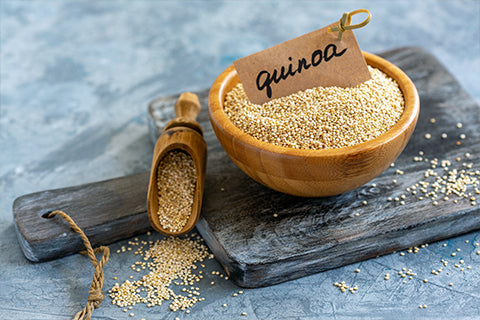
Top 4 Health Benefits Of Quinoa - How To Cook Quinoa?

F
unctional foods which confer health benefits have become increasingly popular with the advent of climate change, accelerated metabolic complications, and a growing population. Quinoa is one such functional food that is attracting global interest in recent times due to its unique nutritional value. Quinoa, Chenopodium quinoa Willd, a member of the Amaranthaceae family has its origin from the Andes region of Bolivia and Peru. Quinoa was called the ‘mother of grains’ by the Incas and was considered a gift from the gods. Inca warriors ate balls of quinoa to keep them going in long marches and in battles. Quinoa includes health-beneficial phytochemicals including dietary fiber, polyunsaturated fatty acids, vitamins, minerals, amino acids, and plant polyphenols. Quinoa has a high proportion of plant-specific antioxidants known as flavonoids which are believed to promote wellness. It is a gluten-free alternative to common cereals. Did you know? The United Nations General Assembly officially declared 2013 the International Year of Quinoa as a credit to quinoa’s rich nutritional content, functional properties, and biodiversity.
QUINOA IS HIGH IN FIBER CONTENT

Unlike digestible carbs like starch and sugars, dietary fibers are non-digestible carbs that are low-energy-dense, and may have an attenuating effect on appetite. Studies have shown fibers to delay gastric emptying, the delay in gastric emptying improves the satiating effect. Upon entering the stomach, fiber will absorb water and swell. The amount of water absorbed and the extent of swelling results in an increase in gastric volume will lead to increased satiety. The total fiber content in quinoa is comparable to other cereals with quinoa containing 7-9% dietary fiber. Fiber promotes healthy gut microbiota, can contribute to reducing cholesterol, lipid absorption, weight loss, and can also reduce the risk of gastrointestinal inflammation.
QUINOA IS A COMPLETE VEGAN PROTEIN

Quinoa is a grain of great nutrition interest, it has garnered attention as a complete vegan protein source with all 9 essential amino acids and high protein content that ranges from 11-19%. The gluten-free, highly bioavailable protein source is considered an alternative to dairy protein and substitutes the lack of animal protein in vegetarians, and vegans.
The protein levels in quinoa are identical to that found in milk and higher than those present in cereals and is much higher than the protein content found in oats, barley, boiled yellow corn, cooked raw rice. Protein helps boost metabolism, promotes feelings of fullness and contributes to weight loss.
QUINOA IS RICH IN ESSENTIAL FATTY ACIDS & LYSINE

Quinoa is a good source of healthy fats with about 15% of calories coming from fat, mostly unsaturated fatty acids. Quinoa is rich in oleic, linoleic, and linolenic acid which are essential fatty acids that can be metabolized into eicosapentaenoic acid (EPA) or docosahexaenoic acid (DHA). Healthy fats are essential to digesting fat-soluble vitamins, stimulate the release of digestive enzymes from the pancreas, and helps maintain healthy cellular functioning. Essential fatty acids are major components of cell membrane structure, they play a role in brain development, heart health, immunity, inflammation, and membrane function. When compared to cereal grains, quinoa proteins are particularly high in lysine. Lysine has a role in protein production, linked to muscle development, and muscle recovery.
QUINOA REGULATES BLOOD SUGAR LEVELS

Quinoa has low glycemic index, the carbs from quinoa are digested more slowly and converted into glucose. Glycemic index indicates how quickly carbs are converted into glucose and to what extent they influence blood sugar. If you want to succeed in weight loss, you need to keep your blood sugar levels as stable as possible, significant drops and rises in blood sugar increases cravings between meals. Quinoa provides sustained energy because glucose is released into the blood quite evenly, fills you up longer and prevents cravings.
AS-IT-IS QUINOA

AS-IT-IS Quinoa is 100% natural, pure, organic, gluten-free, contains zero cholesterol, has slight nutty flavour, fluffy texture and versatility in preparation. The functional food is a good source of dietary minerals like potassium, calcium, iron, sodium, it confers specific beneficial health benefits. Quinoa is rich in B-vitamins which act as enzymatic cofactors in metabolism.
WAYS TO USE QUINOA
COOK THEM SIMILAR TO RICE

-
Roast quinoa in a pan for 5-7 minutes, or until it smells nutty and begins to pop.
-
Add water in 1:2 ratio to toasted quinoa and bring to a boil.
-
Cover and cook for 15 to 20 minutes.
-
Rest cooked quinoa off heat for 5 minutes
-
Once cooked, fluff quinoa with a fork before serving.
BLEND THEM WITH YOUR SALAD
Mix cooked quinoa with carrots, radish, spinach, beets, fresh cucumber, tomatoes, add lemon dressing. This quick, refreshing, delicious, colourful, dairy-free, gluten-free, nut-free, vegan salad packs in the much-needed energy balance for the day.
STIR THEM IN YOUR SOUP
In a cooking pot, over medium flame, heat 2 tablespoon olive oil. Simply cook quinoa with carrots, onions, tomatoes, zucchini, celery, cabbage, beans, and garlic powder. Stir occasionally and cook for 10 minutes until veggies are soft. Add salt and pepper powder for taste. The vegan quinoa soup is super-easy to make, healthy and well-balanced.
MAKE MUFFINS
Quinoa flour is a great gluten-free alternative to substitute wheat flour in muffins or cookies. The protein-rich, fiber-rich quinoa flour is super-healthy, so would be your muffins.
Quinoa is an exotic grain with low-fat, chock full of proteins, fiber, vitamins, and minerals, close to nutritionally perfect…
Waiting to listen more? Go order your pack of quinoa today and use it as a breakfast cereal, a healthy lunch, a hearty dinner or even a dessert…
Also Read : Top 6 Healthy Reasons To Add Flax Seeds To Your Diet
 Follow our Instagram page for the latest updates: badalkhudko
Follow our Instagram page for the latest updates: badalkhudko







Leave a comment